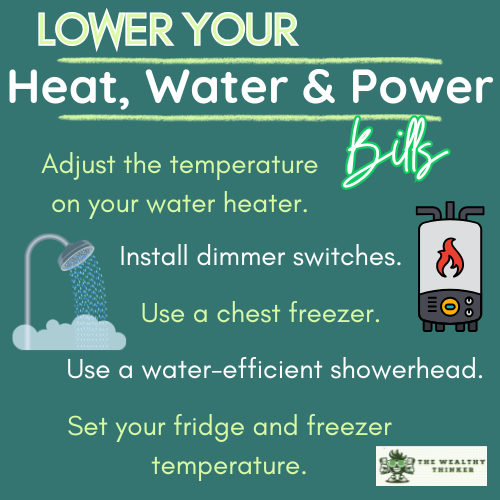As rising energy costs continue to plague us, homeowners and renters alike are feeling the pinch.
Rising heating, cooling, water, and electricity expenses can put a strain on your budget, but the good news is that there are plenty of practical ways to cut costs without sacrificing comfort.
From simple adjustments like lowering your thermostat and unplugging unused electronics to bigger investments like installing solar panels or upgrading to energy-efficient appliances, small changes can lead to significant savings over time.
Whether you want to reduce your carbon footprint or just keep more money in your pocket each month, the key is being mindful of where and how you use energy in your home.
In this guide, we’ll break down 20 smart and effective ways to lower your heating, water, and power bills.
With just a little effort, you can make your home more energy-efficient, decrease waste, and reduce rising energy costs.

Heating and cooling
Home heating and cooling is usually the first place to look at cost-cutting opportunities in your energy bills.
This is because they are the biggest culprits behind hefty utility bills.
1. Check seals on windows, doors, and appliances.
Make sure your fridge and freezer are well sealed to keep the cold air where it belongs.
The same goes for doors and windows. A bad seal allows energy to seep out, meaning it would take longer for your place to cool or heat up, thereby draining your wallet in the process.
2. Fix leaky ductwork.
Whether you do it yourself or hire an HVAC expert, one thing is certain: repairing the leaks will quickly pay for itself.
If left untreated, leaky ducts can quickly become quite costly. This is one of those house repairs that you just cannot overlook!
It’s not difficult to repair your leaking ductwork. If you believe yourself to be handy around the house, you may discover that, like many other homeowners, you can accomplish the project on your own.
However, if the task is onerous or you just want to ensure that the job is completed flawlessly, you may want to consider hiring a professional.
3. Dial back your thermostat.
When you’re sleeping or away from home, dialing back your thermostat by 10 to 15 degrees can save you some money.
Doing so for eight hours can save you roughly 10% on your annual heating and cooling bills. If you find the manual jiggling of your thermostat too much of a hassle, you should consider getting a programmable thermostat.
4. Set your fridge and freezer temperature.
Set your fridge to 38 degrees and your freezer between 0 and 5 degrees.
This will keep your food fresh, but also ensure that your fridge and freezer won’t need to work as hard to maintain the temperature.
5. Install solar panels.
Installing solar panels comes at a high upfront cost, but the benefits can offset electricity costs in the long term.
Homeowners that install solar power systems can receive numerous benefits: lower electric bills, lower carbon footprints, and potentially higher home values.
The time it takes for your solar panel to offset energy costs depends on your geography and monthly energy consumption.
If you live in a sunny part of the country and have high utility bills at the moment, you could be looking at a system that will reach this point in five years. Other homeowners may have to wait 10 or 20 years to reach this point.
8 Little Known Ways Your Family Can Save an Additional $100 Per Month
Water
According to the Energy Department, the second-largest expenditure in powering most households is hot water.
Cutting back on hot water consumption in the shower, laundry, and dishwasher may help you save a lot of money on your rising energy costs.
6. Take shorter showers.
Small changes like reducing the length and temperature of your daily shower can make for cheaper utility bills, no matter what showerhead you’re using.
The benefits of spending less time in the shower aren’t just about your budget, but also saving an incredible amount of water.
7. Use a water-efficient showerhead.
Switching to a more water-efficient showerhead can save you about $70 per year without even accounting for the savings of shorter showers.
The standard showerhead uses about 2.5 gallons of water per minute. If you reduced that by 1 minute daily, you could save more than 900 gallons of water per year.
8. Don’t let the water run before your shower.
Many individuals have the habit of turning on the shower and then waiting a few minutes for it to reach its ideal temperature.
You could even get distracted or do other minor work at this time. The little waste of time could cost you more in terms of how much water has been used, and how much you would pay.
9. Take cold showers.
Taking cold (Or at least colder) showers will save you even more money.
Because you pay to heat your water, lowering your water heating requirements will reduce your energy cost, even if just a little.
10. Don’t wash clothing in hot water.
When doing laundry, use warm or cold water to reduce your per-load energy use by at least half.
11. Repair dripping faucets.
That irritating drip, drip, drip wastes lots of water.
Tiny drops of water combine to form a massive ocean, or in this instance, a massive energy bill.
12. Adjust the temperature on your water heater.
Water heaters usually have a preset temperature of 140 degrees.
Lowering it to 120 degrees will save you up to 10% on your water heating expenditures.
Are you going to be out of town for a few days? To save electricity, set your water heater to the lowest setting.
13. Buy energy-efficient appliances.
If you need a new washer, dishwasher, or water heater, choose an energy-efficient one to save money in the long run.
A dishwasher with the Energy Star rating must consume no more than 3.5 gallons of water every cycle, as opposed to more than 10 gallons in some earlier versions.
Prioritize appliances that are used frequently, such as the refrigerator, air conditioner, water heater, dehumidifier, TV, washer, and dryer.
14. Ask for discounted rates.
Some utility companies provide discounted rates at particular times of the day.
This could reduce the cost of washing and other energy-intensive tasks by 5% to 25% during off-peak hours.
Power and lighting
Keeping the lights and electronics on accounts for roughly 11% or more of a home’s energy usage. Here are some ways to save rising energy costs on them.
15. Use energy-efficient lightbulbs.
When you convert to energy-efficient lighting, you may light your house for less money while getting the same amount of light.
Lighting accounts for around 15% of an ordinary home’s power consumption, and utilizing LED lighting saves the average household about $225 per year in energy expenditures.
Switching to energy-efficient lighting if you’re still using incandescent light bulbs is one of the quickest methods to lower your energy expenses. Choose bulbs that have achieved the ENERGY STAR for high-quality goods that save the most energy.
16. Use a chest freezer.
Standing freezers use 10% to 25% more electricity than chest freezers because when the door is opened, chilly air does not flow out.
Manual-defrost machines use 35 to 40% less energy than automatic-defrost units, which can dry food and cause “freezer burn.”
17. Less use of dryer & hot-water washing.
Using clothes lines to dry wet clothing may seem like a depression-era relic, but the savings add up.
The average electric dryer consumes roughly 970 kWh per year. While modern machines are more energy-efficient and turn off when the clothes are dry, going natural can save you much more money.
18. Install dimmer switches.
Light dimmers are not only a terrific way to change the ambiance in a room, but they may also help you save money on your rising energy costs.
Light dimmers have been around for a long time, but they weren’t always as effective as they are now. They used to just limit the quantity of light that was used, but not the amount of electricity that was utilized. In fact, the unused power was transformed into heat, which led to further hazards!
However, they’re now safer and more energy-efficient. If you have a dimmer that both reduces the flow of electricity and puts less stress on your lightbulbs, you’ll save money on your electricity while also increasing the life of your bulbs.
It’s crucial to remember, though, that not all lightbulbs are made equal.
It’s vital to check before buying because not all bulbs are dimmer-compatible. Dimmer-compatible LED lights are great for saving energy and maintaining color no matter how much you dim them.
Halogen lamps, on the other hand, lose their color efficiency as they are dimmed. Although CFL bulbs (fluorescent lights) have a good reputation, utilizing non-dimmable CFL bulbs with a dimmer can be a huge fire hazard.
19. Use smart power strips.
Some electronic devices never actually turn off; instead, they remain in standby mode, using a little amount of power that adds up over time and devices.
Because the remote sensor requires electricity while waiting for your input, they are frequently — but not always — things with remote control. Connect these gadgets to a smart power strip, which turns off the power when they’re not in use.
20. Unplug appliances when not in use.
An alternative to using power strips is unplugging electronic appliances that are not in use.
The Department of Energy estimates you could save 10% every month when you unplug appliances when not in use.
Appliances such as printers, TVs, and cell phone chargers could be silently draining out and increasing your bills even when in standby mode.
Rising Energy Costs Solutions: Make Energy Efficiency a Habit
Lowering your heating, water, and electricity bills isn’t about making one-time changes—it’s about developing long-term habits that lead to continuous savings.
Whether you’re sealing gaps in windows, taking shorter showers, or swapping out old appliances for energy-efficient ones, each step you take adds up to real financial relief.
By making mindful choices, such as running appliances during off-peak hours, switching to LED bulbs, and using smart power strips, you’ll create a home that not only saves you money but is also more environmentally friendly.
The best part? Many of these adjustments require little effort but offer lasting benefits.
So, start small, be consistent, and watch your savings grow over time. Energy efficiency isn’t just about cutting costs—it’s about creating a smarter, more sustainable way of living.
With the rising energy costs, take charge of your utility bills today, and enjoy a home that works for both your wallet and the planet.
Editor’s note: This article was originally published Jul 4, 2022 and has been updated to improve reader experience.


















